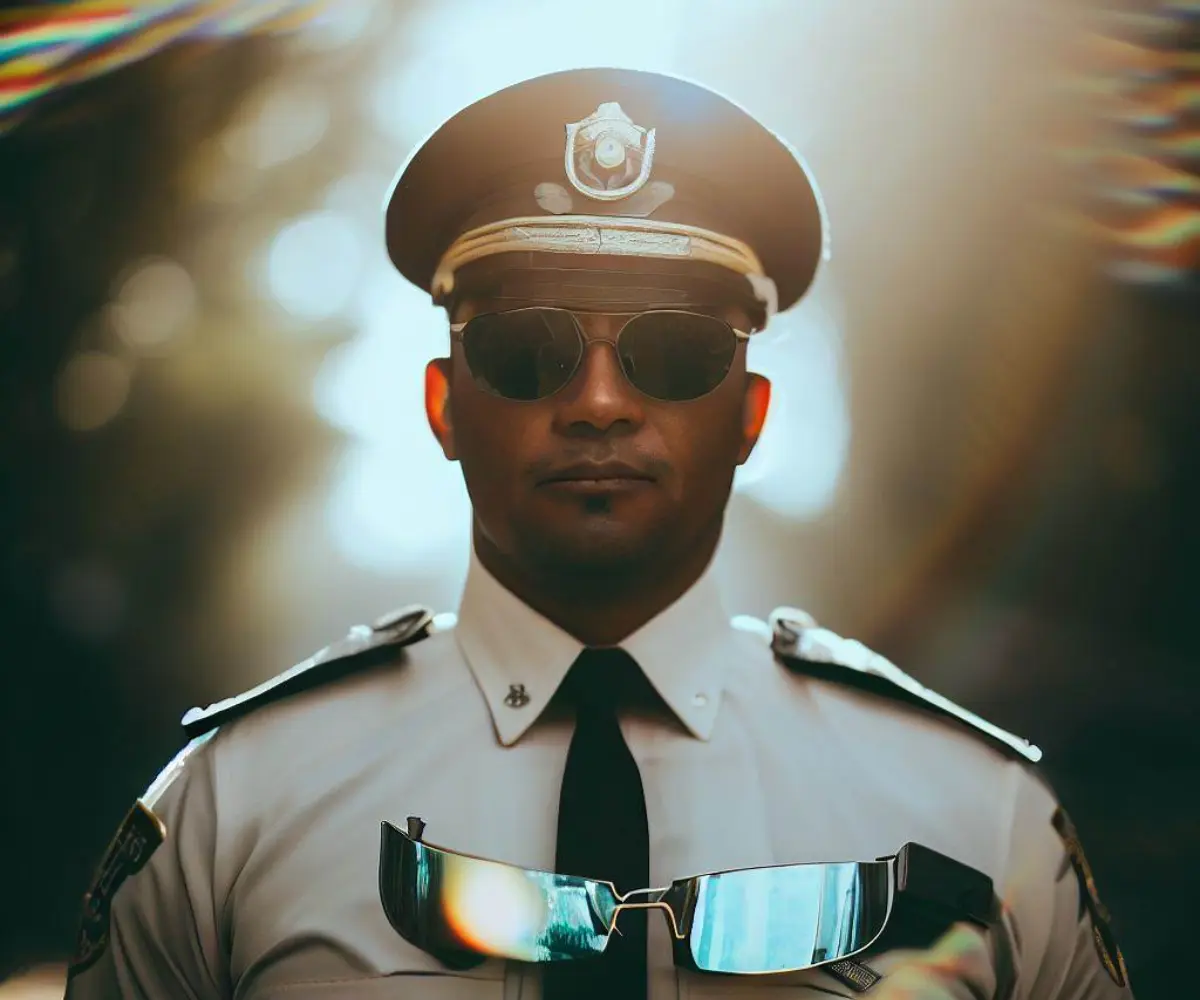When you think of a police officer, an image that often comes to mind is someone wearing sunglasses. Have you ever wondered why cops consistently sport this iconic accessory?
The reasons go beyond just looking cool or adding a touch of mystery. In this article, we will delve into the practical and functional reasons why police officers don sunglasses as part of their uniform.
From eye protection to psychological deterrence, these shades serve multiple purposes that contribute to officer safety, professionalism, and effective law enforcement.
Why Do Cops Wear Sunglasses? Here Reasons Explained!
Topics Covered In This Article
- 1 Why Do Cops Wear Sunglasses? Here Reasons Explained!
- 1.1 1. Eye Protection:
- 1.2 2. Glare Reduction:
- 1.3 3. Concealment of Emotions:
- 1.4 4. Officer Safety:
- 1.5 5. Professional Appearance:
- 1.6 6. Disguising Eye Movement:
- 1.7 7. Protection from Wind and Dust:
- 1.8 8. Increased Focus:
- 1.9 9. Psychological Deterrence:
- 1.10 10. Uniformity and Identification:
- 1.11 11. Protection from Inclement Weather:
- 1.12 12. Tactical Advantage:
- 1.13 13. Eye Fatigue Reduction:
- 1.14 14. Medical Reasons:
- 1.15 15. Photophobia Management:
- 2 Frequently Asked Questions
- 2.1 Do police officers wear sunglasses at night?
- 2.2 Can’t police officers just wear hats instead of sunglasses?
- 2.3 Why do some police officers wear mirrored sunglasses?
- 2.4 Are there specific regulations or guidelines for the type of sunglasses police officers can wear?
- 2.5 Can civilians mistake police officers wearing sunglasses as unapproachable?
- 3 Conclusion:
Police officers often wear sunglasses for various practical and functional reasons. Here are some of the main reasons why cops wear sunglasses:
1. Eye Protection:
Sunglasses provide protection for the eyes from harmful ultraviolet (UV) rays emitted by the sun. Police officers spend a significant amount of time outdoors, and sunglasses help shield their eyes from excessive sunlight, which can cause discomfort and potentially damage their vision.
2. Glare Reduction:
Sunglasses are particularly useful in reducing glare, especially when officers are patrolling during sunny days or in areas with reflective surfaces such as water, glass, or polished metal. By reducing glare, sunglasses improve visibility and allow officers to better observe their surroundings, spot potential hazards, and maintain situational awareness.
3. Concealment of Emotions:
Wearing sunglasses can help conceal an officer’s emotions or facial expressions, making it harder for individuals they encounter to gauge their reactions. This can be advantageous in certain situations, as it gives officers an added layer of psychological advantage and control over potentially volatile encounters.
4. Officer Safety:
Sunglasses can provide a degree of protection to an officer’s eyes in potentially dangerous situations. They act as a barrier between the officer’s eyes and external objects, debris, or substances that may be thrown or propelled towards them during altercations or crowd control scenarios.
5. Professional Appearance:
Sunglasses are part of the standard uniform for many police departments. They contribute to the overall professional and authoritative appearance of police officers, which can help establish their presence and command respect in the community.
It’s important to note that while sunglasses serve practical purposes for law enforcement, they are not worn at all times. Officers may remove their sunglasses when engaging in specific tasks that require direct eye contact or when interacting with individuals in a more personal or empathetic manner.
6. Disguising Eye Movement:
Sunglasses can help officers conceal their eye movements, preventing potential suspects or individuals from detecting where they are looking. This can be particularly useful in covert surveillance or investigative operations.
7. Protection from Wind and Dust:
When officers are riding motorcycles or patrolling in open vehicles, sunglasses provide protection from wind, dust, and other airborne particles that could potentially irritate the eyes and impair vision.
8. Increased Focus:
By reducing excessive sunlight and glare, sunglasses help officers maintain focus on their surroundings, especially in high-stress situations. Clear visibility enhances their ability to detect suspicious activities or behaviors.
9. Psychological Deterrence:
The presence of sunglasses can create a psychological deterrent effect, as they can add an air of mystery and authority to the officer’s appearance. This can discourage potential offenders from engaging in unlawful activities or challenging law enforcement.
10. Uniformity and Identification:
Sunglasses are part of the standardized uniform for many police departments. By wearing them, officers can be easily identified as law enforcement personnel, promoting public trust and ensuring uniformity within the organization.
11. Protection from Inclement Weather:
Sunglasses offer protection against adverse weather conditions such as rain, snow, or hail, which can otherwise hinder an officer’s visibility and performance.
12. Tactical Advantage:
In certain tactical situations or undercover operations, sunglasses can help officers maintain a tactical advantage by shielding their eyes and preventing adversaries from easily identifying them.
13. Eye Fatigue Reduction:
Continuous exposure to bright sunlight can lead to eye fatigue and strain. By wearing sunglasses, officers can alleviate some of the eye strain caused by prolonged exposure to sunlight, allowing them to stay alert and focused for longer periods.
14. Medical Reasons:
Some police officers may have specific medical conditions or sensitivities to light that require them to wear sunglasses for their eye health and comfort.
15. Photophobia Management:
Sunglasses can assist officers who suffer from photophobia, a condition characterized by extreme sensitivity to light. Wearing sunglasses helps mitigate the discomfort and potential vision problems associated with this condition.
It’s important to note that the specific reasons for wearing sunglasses may vary among individual officers and police departments based on factors such as regional climate, job responsibilities, and department policies.
Frequently Asked Questions
Here are frequently asked questions about why cops wear sunglasses:
Do police officers wear sunglasses at night?
No, police officers typically do not wear sunglasses at night. The primary purpose of sunglasses is to reduce glare and protect the eyes from excessive sunlight during daylight hours.
Wearing sunglasses at night can impair an officer’s vision, hindering their ability to see clearly in low-light conditions. However, there may be specific scenarios where officers wear specialized eyewear with clear lenses designed for low-light conditions or to protect against hazards such as dust or debris.
Can’t police officers just wear hats instead of sunglasses?
While hats can provide some shade, they do not offer the same level of eye protection and glare reduction as sunglasses.
Hats primarily shield the face and head from direct sunlight, but they do not effectively block out harmful UV rays or reduce glare from reflective surfaces. Sunglasses provide a more comprehensive solution by covering the eyes and offering specialized lenses that enhance visibility in various lighting conditions.
Why do some police officers wear mirrored sunglasses?
Some police officers wear mirrored sunglasses for an added level of privacy and concealment. Mirrored sunglasses have a reflective coating on the outside of the lenses, making it difficult for others to see the officer’s eyes or discern their focus or emotions.
This can be advantageous in certain situations, especially when dealing with potentially confrontational individuals or during undercover operations where maintaining anonymity is crucial.
Are there specific regulations or guidelines for the type of sunglasses police officers can wear?
Different police departments may have specific regulations or guidelines regarding the type of sunglasses officers can wear. These guidelines often ensure that sunglasses maintain a professional appearance, offer adequate protection from UV rays, and do not obstruct an officer’s vision.
Many departments specify factors such as lens tint, frame style, and adherence to safety standards to ensure that sunglasses meet the required standards for law enforcement use.
Can civilians mistake police officers wearing sunglasses as unapproachable?
While sunglasses may create a barrier that conceals facial expressions, making officers appear more authoritative, it is essential to remember that their primary role is to serve and protect the community.
While some individuals may perceive officers wearing sunglasses as unapproachable, it is not a reflection of their willingness to assist or engage with the public. Police officers receive training to establish effective communication and build rapport, regardless of whether they are wearing sunglasses.
They are committed to maintaining public safety and are available to address concerns or provide assistance whenever needed.
Remember, if you have any questions or concerns when interacting with a police officer, it’s always best to approach them respectfully and communicate your needs clearly.
Conclusion:
As I’ve explored, the reasons why police officers wear sunglasses extend far beyond mere fashion choices. These essential accessories offer crucial benefits that enhance officer safety, improve visibility, and support their ability to uphold the law effectively.
Whether it’s shielding their eyes from harmful UV rays, reducing glare, or concealing emotions, sunglasses serve as a practical tool for law enforcement professionals. So, the next time you spot a cop donning shades, remember that there’s more to it than meets the eye. It’s a small but significant part of their commitment to protecting and serving their communities.
Read Also:
Why Do People Wear Sunglasses Inside?
Why Do Celebs Wear Sunglasses? Unveiling the Secrets Behind Their Shades
How to Polish Sunglasses Frames: A Complete Guide for Sparkling Frame

Walter Hendricks is a well-known authority in the eyewear industry, specializing in a diverse range of products such as gaming glasses, swimming goggles, sunglasses, eyeglasses, computer glasses, and fashionable daily-wear eyewear.
Hendricks believes in empowering his readers with in-depth information to help them choose the right glasses that blend functionality and fashion, catering to their unique lifestyle requirements.
His comprehensive reviews and informative articles provide clear insights on everything from cutting-edge gaming glasses to the latest trends in eyewear fashion. Through his work, Hendricks has proven his dedication to helping consumers make informed eyewear decisions that support both their visual needs and style preferences.

